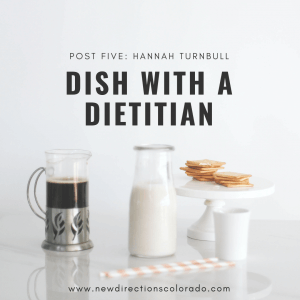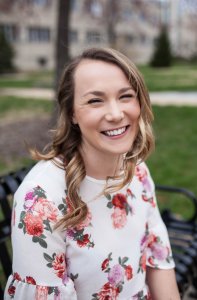Set-Point Theory | Dish With A Dietitian

As I work with my clients, I strongly suggest working with a registered dietitian during recovery. There are times when questions surface during session that can be better answered by a dietitian rather than an eating disorder therapist. Dietitians are an integral part of an eating disorder and disordered eating treatment team. Registered dietitians are educated professionals who know about not only food but also the way nutrition interacts with our unique bodies along with how nutrition can help improve our overall wellbeing. Set-point theory and Health at Every Size (HAES™) can be confusing!
Each month, New Directions Colorado features a local dietitian to help answer various questions you have. The goal of these blog posts is to familiarize yourself with local dietitians, have additional recovery resources and to ask questions in a format that may feel less intimidating before scheduling an in-person session with them.
Having the task of finding the right fit in a provider (i.e. mental health therapist, dietitians, psychiatrists and medical doctors) for your unique goals and needs can be overwhelming. Not all providers will be a good fit for you. We completely get that and want you to be successful in your recovery. Listen to your intuition on the right fit. Now, let us move forward to today’s guest dietitian!
Hannah Turnbull, RD | Nourished With Hannah

Denver Colorado Registered Dietitian helps answer questions from individuals who struggle with disordered eating and eating disorders.
I’ve heard “HAES” and not caring about weight or the number on the scale. Do you feel like some of your clients are permanently stuck in “larger bodies”?
This is such a wonderful questions! HAES, or Health at Every Size™, is the idea that health can be pursued (if someone wants to; health is not a moral obligation) regardless of weight or BMI. There are 5 principles that are about respectful and ethical care for all bodies. For more insight into HAES, Click here
Our body size is dependent on many factors; the main one being our genetic blueprint. Set point theory comes to mind when thinking about genetics and why bodies are the size that they are. Set point theory is the idea that due to genetics, bodies have a weight range (everyone’s being SO different) that they like to stay between; a weight range they function optimally at. What we find with people who chronically diet, or struggle with disordered eating, is that set point CAN actually increase.
When someone experiences bouts of restriction from dieting or struggling with an eating disorder, our incredibly smart and kind bodies kick into starvation mode: our metabolism slows down to conserve energy-it doesn’t want to waste any energy it doesn’t have to expend. When someone ends their dieting phase (because diets don’t work!) or inevitably binges-what restriction leads to-our bodies do exactly what they need to do to protect us: gain weight back that was lost (if any), and store more weight which in turn can increase our set point.
Our body doesn’t know we live in diet culture and that we are *trying* to change our body; it just thinks “OMG i’m starving, we are going through famine, I must protect us and make sure that next time this happens, we have more energy stores.”
It gets really confusing because we live in a culture that demonizes weight gain and larger bodies, and preaches we have control over our body size so we should all strive to be “thin”. This is quite frankly bullshit, and many people use disordered behaviors to try and get to this impossible ideal.
So, to circle back to your question about people being permanently “stuck”, I think it’s important we change the thought of being “stuck” to accepting that people come in all shapes and sizes, and that all bodies are deserving of care and respect.
I support weight neutrality and health at every size (HAES). I also feel like there are exceptions to the rule. Meaning, some bodies can experience health in larger bodies and that weight is not indicative of health. However, I am finding it difficult to believe that this is my “set-point” weight. I am in the “obese” category with a higher BMI and my weight is toward the high end of the obese category. I feel like my body is not experiencing health. I know being at the low end of weight is also not my goal, but I do need some relief. How would you work with somebody like me and support my desire to lose weight?
First, I am sending you SO much compassion because one of the hardest parts of recovery is body acceptance. I want to make a point to say that health at every size isn’t saying that weight doesn’t matter, but rather is saying the pursuit of intentional weight loss is harmful. It’s also not against weight loss; if someone loses weight due to healthful, self care behaviors it’s not a moralistic good or bad thing (remember, we are inclusive of ALL body sizes and not preference one over another), it just means that someone wasn’t at their set point.
Health at every size is not to be confused with everyone being HEALTHY at every size-I see people in small bodies who have health complications. I see people in large bodies with health problems. Many of the health complications are the SAME. And to blame health complications on weight is not helpful. Weight is just a symptom (in the most neutral way), not a cause. And it’s not to say that weight doesn’t matter at all, but we don’t have a way for people to lose weight and keep it off long term without disorder if they weren’t even meant to be that size. Something important to note is that the pursuit of weight loss leads to more weight gain through weight cycling (the process of losing weight while dieting, then regaining when the diet inevitably fails)-it also wreaks havoc on our metabolism and physiological function.
I want you to know I honor and respect your desire to lose weight. If you live in a larger body, OF COURSE you want to lose weight. We live in a toxic fat-phobic society that rewards people for living in smaller bodies. Thin privilege is a real thing. But I want you to know, all bodies are good bodies. Your body deserves respect and care, regardless of what size it is. I hold space for the desire to lose weight; so many of my clients can relate to your desire. And, I hope it’s something we can work to put on the back-burner so we can focus on your wellbeing through healthful sustainable behaviors and gentle nutrition.
I am not trapped in the diet cycle anymore, however I feel like I have not cared about what I eat, leading to more discomfort and physical symptoms (weight gain, heartburn, feeling winded from just walking up steps in my home). How can I start taking steps to lose weight without subscribing to diet culture, without being hyper-focused on the scale and without obsessing about food choices?
I’m so glad you asked this question!!!!! First, I am so proud of you for exiting the dieting cycle: it’s a very hard part of recovering especially when a lot of the time it’s the only way we have ever known to eat. As humans, it is very easy to get into “black and white thinking”, meaning we swing from one end of the spectrum to the other- you may feel like you went from hyper-focusing on your food and weight to feeling a little bit rebellious against diet culture (as you should! diet culture sucks!!). Our brains love this kind of black and white thinking -it’s easier than finding middle ground. And, it’s not really helpful for us when we are trying to learn to take care of ourselves. So, what I often challenge people in this place to do is to start really thinking: What makes me feel good? What do I enjoy doing for self care? What would be an ideal day where I feel cared for, regardless of if my weight changes or not?
In regards to your desire to lose weight, I would like to reiterate that I so understand and have compassion for your desire to lose weight and can hold space for that AND I hope we can put it on the back-burner while you work with your therapist and dietitian on what wellbeing looks like for you. I have to be 100% honest and say it is impossible to focus on losing weight without being hyper-focused on the scale and food choices because this means our choices are being driven by our desire to change our bodies versus our desire to be well. I also know how challenging this is because our culture has tangled the two when in reality, we don’t need to focus on our body in order to find our healthy self.
With this being said, there are definitely steps you can take to take care of yourself. I will speak generally here as it is challenging for me to give specific advice as I don’t know your situation or experience. A great first place to start is making sure you are eating regular meals and snacks: our bodies really love being fed every 3-5 hours, this helps regulate our blood sugar, hormones, mood and many other physiological functions. Incorporating a variety of foods from all food groups is helpful for meeting our hunger, fullness and satisfaction needs, as well as macro and micronutrient needs. Along with this comes working on removing “good” or “bad” connotations with certain foods. Feeling neutral towards all foods will help remove external pressures for what to eat. Also, don’t feel badly if you need a little bit of structure and find it difficult to go straight from chronic dieting to what we call “intuitive eating”. Many of my clients find it helpful to have a “meal plan” which doesn’t tell them WHAT to eat, but rather how to put together meals and snacks with foods that make them feel food, challenge food rules they have and foods they find pleasure in eating.
I am nervous to work with a dietitian because I have not had the willpower to be successful on diets. Do I need willpower to work with you?
As a non-diet dietitian, I recognize that DIETS DO NOT WORK and it’s NOT about willpower. What I’ve found from my amazing clients is they are the most dedicated and devoted humans in the world-it’s literally the fact that 95% of diets fail. You didn’t fail the diet due to lack of willpower, but rather the diet failed you-this is how they are designed. A 60 billion dollar industry makes money off the vicious cycle of going on a diet, going off a diet, feeling like a failure because it didn’t work, and then seeking another diet that will inevitably fail.
I know what you may be thinking: dietitian has the word diet in it! What do you mean you don’t prescribe diets? But, I don’t! Putting people on diets isn’t helpful, it’s actually harmful because it leads people down a disordered eating path and dieting doesn’t lead to better health. What I’ve found to be helpful is working one-on-one with my clients, learning as much as I possibly can about their dieting history, experiences in life that have affected how they feel in their body, a health history, life circumstances, and collaboratively making goals and plans that are sustainable and support wellbeing. All you need to work with me is to have a body 🙂
What is in your Thanksgiving spread?
So, this thanksgiving will be very interesting because it’s the first time my boyfriend and I are not going back to Missouri to see our family, so we will be having our own little gathering. We plan on having all the deliciousness: roasted turkey with stuffing, bomb-ass mashed potatoes with all the butter, green bean casserole, roasted veggies, and some pumpkin pie 🙂
HANNAH’S EXPERIENCE
Hannah earned her Bachelors degree with a dual emphasis in Medical Dietetics and Nutrition and Exercise Physiology from the University of Missouri-Columbia. Hannah is an ASCM certified group fitness instructor. She completed an internship through the coordinated program in dietetics from the University of Missouri-Columbia.
Hannah specializes in intuitive eating, disordered eating recovery, and diabetes management using a Health at Every Size™ approach.
Hannah states, “My mission is to help you overcome your fears and provide a balanced & flexible approach to nutrition.”
Creating Your Treatment Team
To find out more about Hannah, check out Nourished With Hannah. If you are on social media, it is helpful to know that Nourished With Hannah is also! Check out the following links:
- FaceBook, Nourished With Hannah
- Instagram, @hannahrdn
Hannah Turnbull can also be contacted via phone at (636)290-0469 or by email at hello@nourishedwithhannah.com

If you or someone you know is suffering from an eating disorder, contact an eating disorder therapist right away. Call 720-306-1631 to set up your free 30 minute consultation, where we can check in with what’s present for you and you may ask a trained eating disorder therapist any questions you might have. You may also learn more about eating disorder therapy offered by New Directions Colorado, here.
© Erica Faulhaber 2018 – This blog may be shared or reprinted as long as the information is unedited and the author bio, including contact information is printed along with the blog.
 Erica Faulhaber PhD, NCC, LPC, CEDS, Certified EMDR Therapist and EMDR Consultant-In-Training. She is a therapist in Erie, Colorado who helps women struggling with trying to be perfect all the time. New Directions Colorado, is a therapy practice that specializes in eating disorders/disordered eating, trauma and Eye Movement Desensitization and Reprocessing (EMDR).
Erica Faulhaber PhD, NCC, LPC, CEDS, Certified EMDR Therapist and EMDR Consultant-In-Training. She is a therapist in Erie, Colorado who helps women struggling with trying to be perfect all the time. New Directions Colorado, is a therapy practice that specializes in eating disorders/disordered eating, trauma and Eye Movement Desensitization and Reprocessing (EMDR).
Leave a Reply